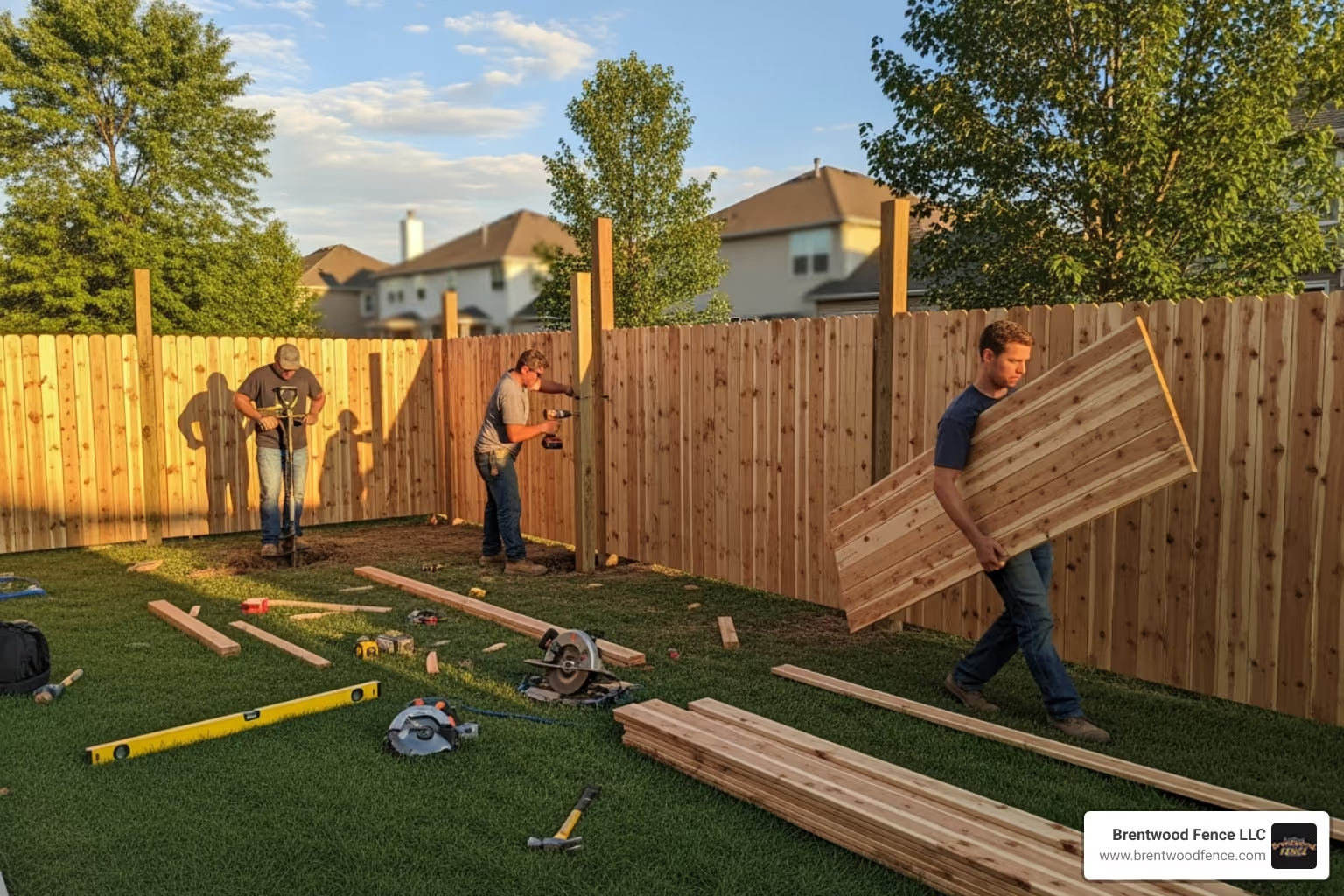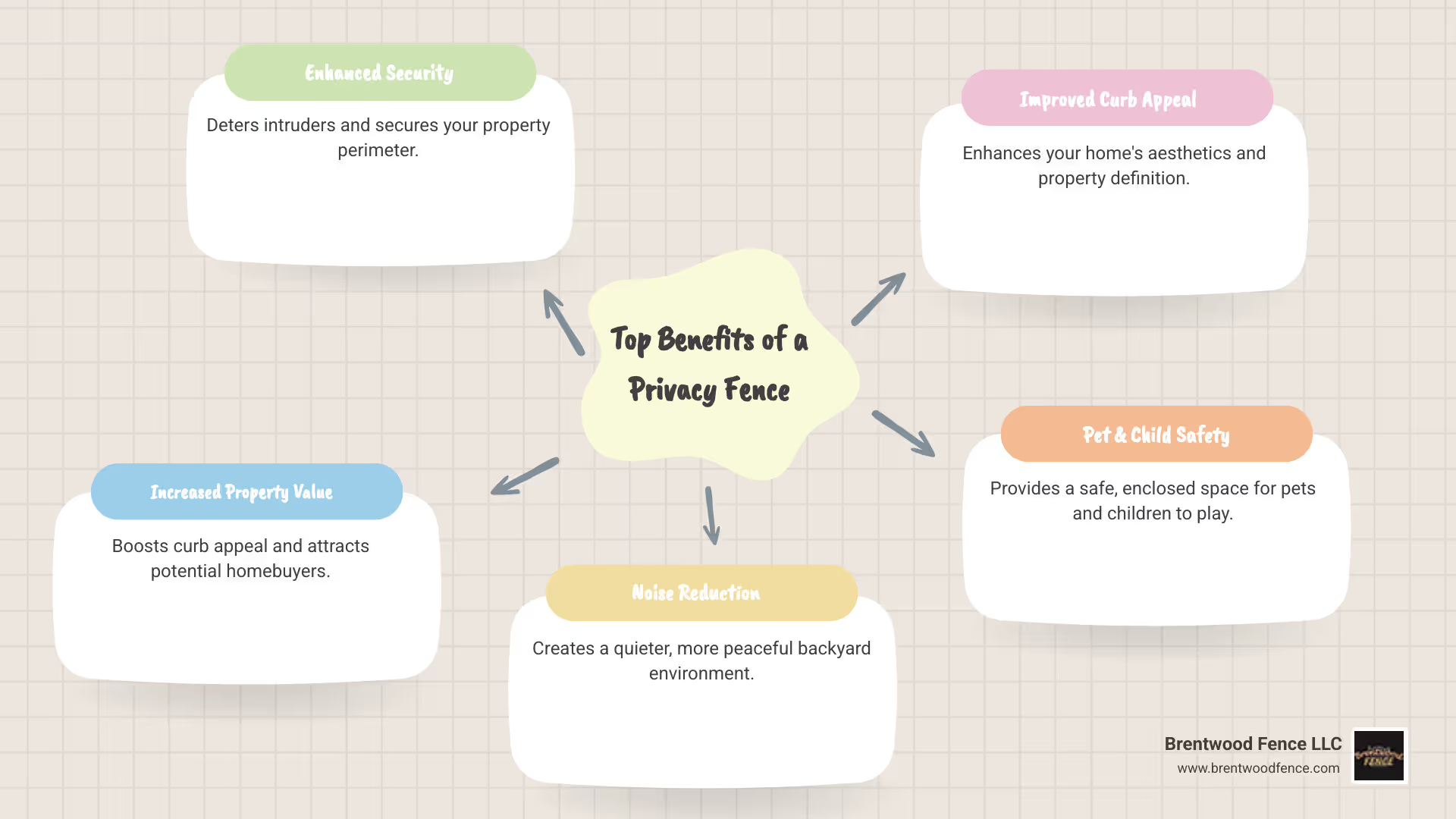Blog Content
20
Sep
2025

Your fence is more than just a boundary - it's your property's first impression and your family's sanctuary. As one fence professional puts it: "Your fence is the first handshake you offer to customers. Before they even step inside, it sets the tone for your business, communicating professionalism, security, and attention to detail."
A quality privacy fence delivers multiple benefits, making it one of the smartest home improvements you can make. Security tops the list, creating a barrier that deters intruders and keeps children and pets safely contained. Beyond safety, a professional fence installation significantly boosts property value, appealing to buyers looking for move-in-ready homes. A solid fence also provides surprising noise reduction from street traffic and improves curb appeal by framing your property with materials like classic wood or low-maintenance vinyl.
Today's professional fence installers use advanced techniques and high-quality materials to ensure your fence lasts for decades. The key is choosing experienced local privacy fence installers who understand your area's climate, soil conditions, and building codes.

Choosing the perfect privacy fence involves balancing seclusion, aesthetics, climate, and budget. This guide covers the most popular materials and styles to help you make an informed decision.
Each fencing material offers unique advantages in durability, maintenance, and appearance.
Wood FencingWood offers a timeless, natural beauty that can be customized with stains and paints. It provides a solid privacy barrier and is a classic choice. In New England climates (Exeter NH, New Hampshire, Massachusetts, Maine), the best woods include redwood, cedar, and pressure-treated pine. Northern White Cedar is highly recommended for its natural resistance to rot and insects.
Advantages of wood fencing for privacy: Wood has a warm aesthetic and is generally more affordable upfront. With proper maintenance like regular sealing, it can last up to 20 years. However, it requires more upkeep than other materials.Advantages of wood fencing for privacy
Vinyl FencingVinyl (PVC) fencing is popular for its low-maintenance nature and long lifespan. High-quality virgin vinyl is engineered for impact strength and UV resistance, meaning it won't decay, peel, or suffer from insect damage.
Advantages of vinyl fencing for privacy: Vinyl is virtually maintenance-free, requiring only occasional rinsing. While the initial cost is higher than wood, its durability and lack of maintenance costs make it a smart long-term investment, often backed by a lifetime warranty.Advantages of vinyl fencing for privacy
Composite FencingComposite fencing combines wood and plastic, offering the look of wood without the vulnerability to rot, warping, or insects. It's a durable, low-maintenance option that can last up to 25 years.
Aluminum FencingKnown for its ornamental look, aluminum is lightweight, rust-proof, and strong. It provides the look of wrought iron without the heavy maintenance and often comes with a lifetime warranty.
Chain-Link with SlatsThis is typically the most affordable option. Privacy is achieved by adding slatted inserts. Galvanized or vinyl-coated steel chain-link can last 15-25 years.
Here's a quick comparison of some popular privacy fence materials:
In New England, a fence must withstand harsh winters and humid summers. Materials like vinyl and composite excel in resisting moisture and temperature extremes without warping or cracking. High-quality options include UV inhibitors to prevent sun damage and fading. For wood, naturally resistant choices like Northern White Cedar or pressure-treated pine are essential to prevent rot and insect damage in our damp climate. Choosing a material suited for our region ensures your fence will last, maximizing your investment.
Beyond material, style affects both function and aesthetics. Privacy Fence Ideas NH, MA, ME

The right style depends on your specific needs. Our local privacy fence installers can help you visualize these options on your property.
A privacy fence is a significant investment, but understanding the pricing helps you budget accordingly. Installation costs typically range from $7 to $45 per linear foot, largely dependent on your choice of material.
For a typical residential project, most homeowners can expect to invest between $1,760 and $4,500. This total is a combination of material and labor costs.
Material costs include panels, posts, gates, and hardware. The material you choose—wood, vinyl, composite—is the primary driver of this cost.
Labor costs cover the professional installation, which can take 24 to 72 hours. This includes site prep, digging post holes, setting posts, and installing the fence. In New Hampshire, Massachusetts, and Maine, regional pricing can also vary based on local labor rates and material availability.
Several factors beyond simple length will affect your final quote:
For homeowners who need help managing the investment, financing options for fence installation can make your project more manageable.
When getting quotes, it's smart to contact several reputable local privacy fence installers. Always ask for an itemized estimate that breaks down material and labor costs. This transparency helps you compare offers fairly and identify any potential hidden fees. Discuss permit requirements upfront, as some contractors include this service while others do not. Don't hesitate to ask about financing options, as many installers offer payment plans to help spread out the investment.
Finding the right fence contractor is crucial for a successful privacy fence project. Knowing what to look for simplifies the process.
When evaluating contractors, prioritize these qualities:
Local Fence Builder in My Area NH, MA, ME
Once you have a shortlist, ask these questions to learn more about their process and reliability:
Fence installation is subject to local rules, and a professional installer's expertise is invaluable here.
Example of municipal fence codes

The best local privacy fence installers are experts in these regulations and will guide you through the process, often handling the permit applications for you. This peace of mind is a key benefit of hiring a professional.
Knowing what to expect during installation helps ensure a smooth process from start to finish.
A little preparation on your part helps the installation crew work efficiently:
A professional installation follows a clear sequence:
A typical residential project of 150-200 linear feet usually takes 2-4 days, depending on terrain, weather, and materials.
Modern fencing materials are designed for longevity with proper care.
Best Privacy Fence Options NH, MA, ME
Reputable local privacy fence installers typically offer a one-year labor warranty. Material warranties vary, with vinyl and aluminum often carrying lifetime coverage. Clarify all warranty details before signing a contract.
Here are answers to the most common questions we receive from homeowners in New Hampshire, Massachusetts, and Maine.
A standard residential project (150-200 linear feet) usually takes 2-4 days. The timeline can be affected by property terrain, weather, and material choice. The first day is often for setting posts in concrete, which must cure for 24-48 hours before panels can be installed.
Yes. A professionally installed, high-quality privacy fence significantly boosts curb appeal and property value. It is a highly desirable feature for homebuyers, especially those with children or pets, as it provides a secure and defined outdoor living space.
You should expect two types of warranties. First, a labor warranty from the installer, typically for one year, which covers the quality of the installation. Second, a manufacturer's warranty on the materials. Vinyl and aluminum fences often come with lifetime or limited lifetime warranties against defects and fading.
Your privacy fence is more than a boundary; it's an investment in your home's security, value, and your family's sanctuary. The difference between a fence that lasts for decades and one that fails prematurely lies in quality materials and expert installation.
Professional local privacy fence installers ensure every detail is correct, from setting posts in concrete to hanging gates that function perfectly for years. They understand the challenges of the New England climate and use the right techniques and materials to build a fence that stands the test of time.
This investment pays dividends in increased property value, a safer space for children and pets, and the priceless peace of mind that comes with a private outdoor retreat.
For homeowners throughout New Hampshire, Massachusetts, and Maine, the right installer makes all the difference. You deserve a team that delivers superior craftsmanship and honest advice.
Ready to transform your property with a privacy fence built to last? Your outdoor sanctuary is just a phone call away.
Copyright 2022 Brentwood Fence | All Rights Reserved | Sitemap | Website by Plumb Development a Digital Marketing Agency